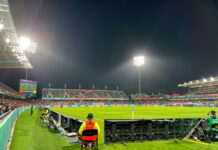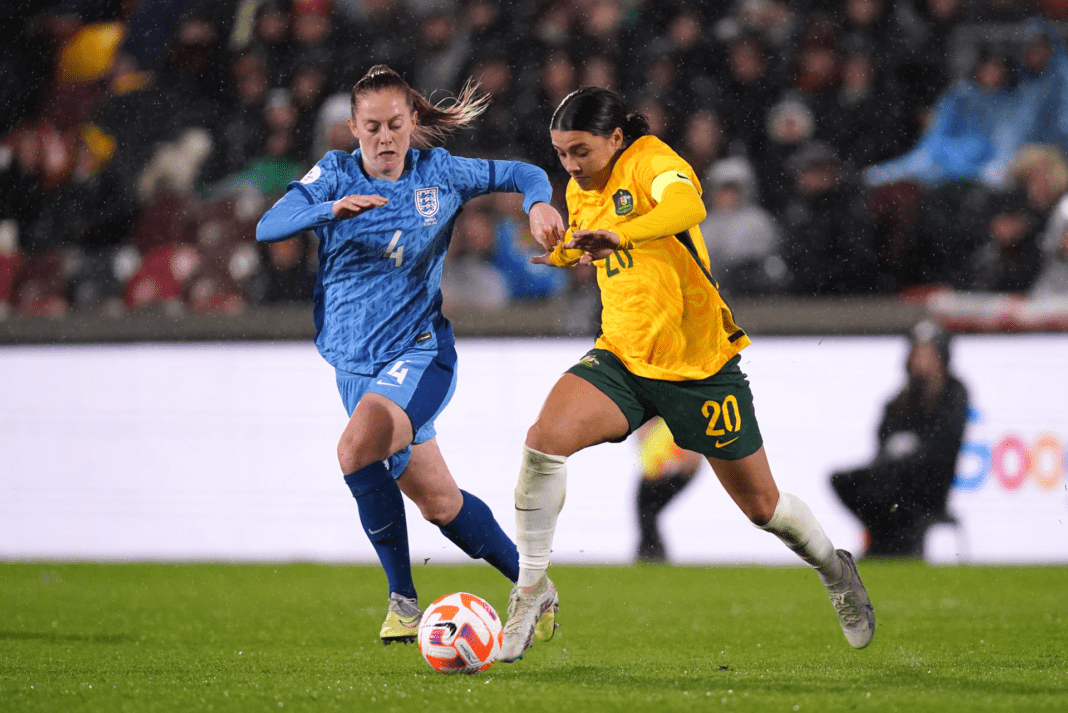
Well Saturday sure was a lot, wasn’t it? The tension, the relief, the jubilation – Australian fans went through almost every emotion as the Matildas defeated a brilliant France team 7-6 on penalties after a scoreless 120 minutes.
Having already made history, the hosts are faced with their toughest test to date: reigning European champions and tournament favourites England. After falling to eventual champions the United States in the semi-final four years ago, the Lionesses will be keen to atone for their previous misgivings and qualify for their second tournament final in a year.
Last Time Out
England 0 Australia 2 – Brentford, 2023
Like the Matildas’ match against France, we’re lucky to not have to fire up the VHS player to review these two teams’ last hit-out, as their sold-out fixture in west London was just four months ago. Missing starters Caitlin Foord, Steph Catley, and Alanna Kennedy, and with then-fringe player Clare Hunt deputising alongside Clare Polkinghorne in the centre of defence, Australia handed a full-strength England side its first defeat in 30 matches – a total of 728 days – thanks to goals from Sam Kerr and Charlotte Grant.
Likely Starting XIs
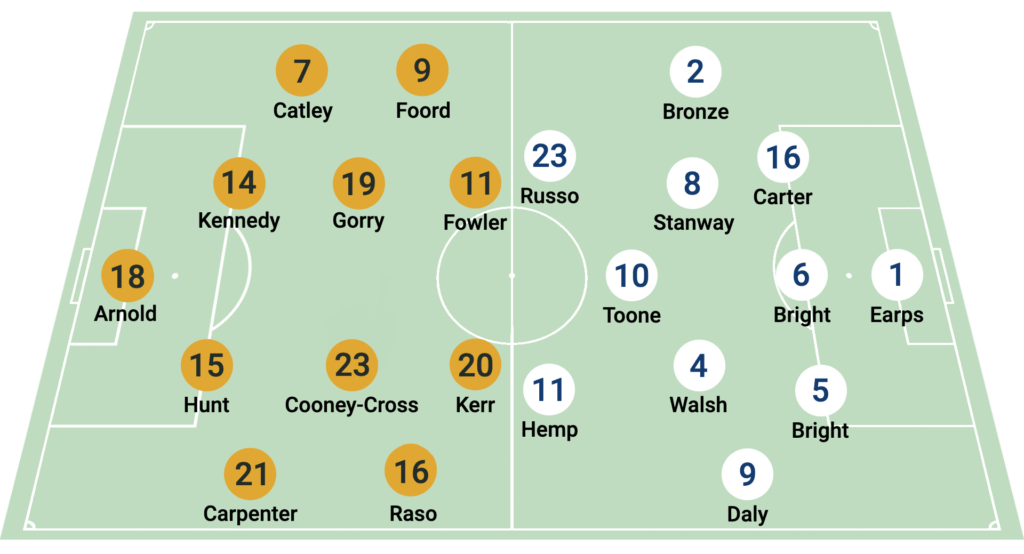 Having been loathed to rotate his squad throughout the tournament to this point, Matildas boss Tony Gustavsson, has publicly stated his preference for recovery over on-field training in the lead-up to the semi-final, and will likely rely on his sports science team to patch the side back together after 120 minutes and penalties against France. After logging 65 minutes off the bench in the quarter-final, Sam Kerr appears to be close to full fitness and will likely start alongside Mary Fowler in a two-pronged attack, with Emily van Egmond returning to the bench.
Having been loathed to rotate his squad throughout the tournament to this point, Matildas boss Tony Gustavsson, has publicly stated his preference for recovery over on-field training in the lead-up to the semi-final, and will likely rely on his sports science team to patch the side back together after 120 minutes and penalties against France. After logging 65 minutes off the bench in the quarter-final, Sam Kerr appears to be close to full fitness and will likely start alongside Mary Fowler in a two-pronged attack, with Emily van Egmond returning to the bench.
Like her Australian counterpart, England manager Sarina Wiegman is expected to deploy the 3-4-1-2 with which she has kept so much faith throughout the latter half of the tournament. With yellow card accumulations waived for the semi-finals and several players having been rested for England’s match against China or substituted late on against Colombia, Wiegman will have a full squad to choose from bar the suspended Lauren James, likely again to be replaced in central midfield by Manchester United playmaker Ella Toone.
Three Key Battles
The Crowded Midfield
Designed for maximum tactical flexibility, Wiegman’s 3-4-1-2 formation allows for a variety of defensive and midfield layouts should they be required as matches progress. Able to drop right-winger Lucy Bronze deeper and push left-sided defender Rachel Daly further into attack to create a flat-back four, or move Toone into a traditional box-to-box midfield role to flood the centre third, the England manager has an array of options at her disposal.
By way of contrast, any fan worth their salt would realise the perceived shallowness of Australia’s willingness to change formation should they need to chase the game in search of victory – a feat not achieved since the side’s 3-1 win over Denmark in October 2022. Blessed with attacking talent but threadbare in terms of tested central midfield options over the past 12 months, Gustavsson has relied on the versatility on Emily van Egmond and industry of Tameka Yallop when required to plus gaps in the middle of the field, while the more defensively-minded Clare Wheeler has struggled to embed herself as the first-choice substitute, not seeing any playing time since a five-minute cameo last time out against England.
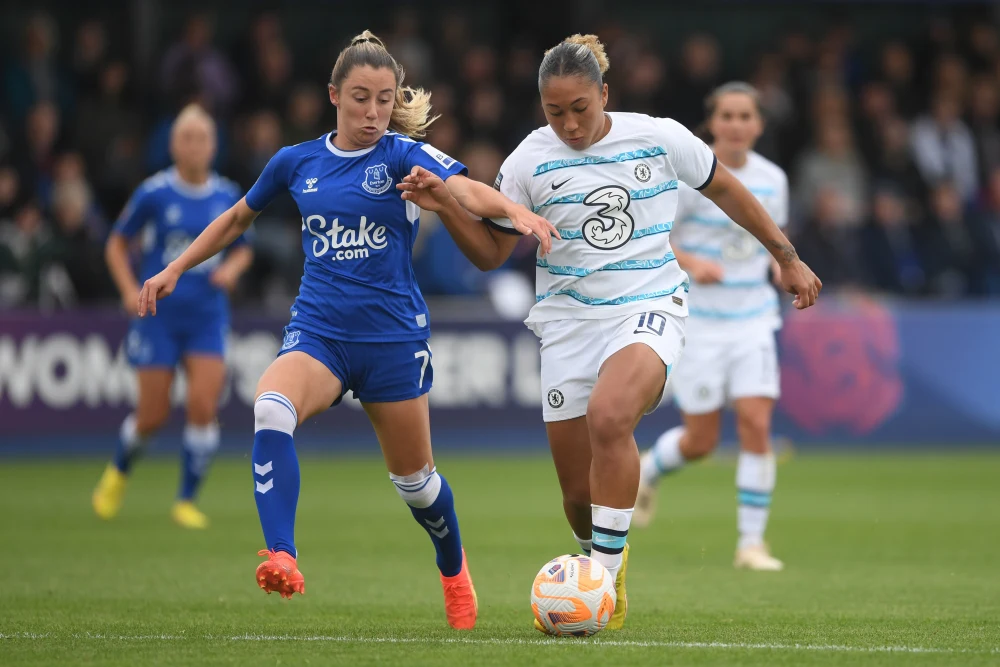
That malleability on the whiteboard brings with it unique challenges for Gustavsson and his cohort, pressuring them as the contest evolves to adapt to the ebb and flow of Wiegman’s tactics while also seeking to maintain a game plan and narrative of their own. That Gustavsson’s relatively dogmatic preference of the Australian 4-2-2-2 – as shown in the prior five matches – has shown his unwillingness to make changes through the 90 or 120 minutes is his prerogative, but fans and media alike have been far from shy in questioning his rigidity of thought, especially in these high-stakes matches.
Lucy Bronze vs Caitlin Foord
Currently in the employ of European champions Barcelona, Lucy Bronze has for most of the past decade been the best right-back in women’s football. A four-time Champions League winner, Bronze has been a lynchpin of the Lionesses far beyond what some described as her break-out World Cup in 2019, a tournament in which she won the Silver Ball for the tournament’s second-most-valuable player behind all-conquering American winger Megan Rapinoe.
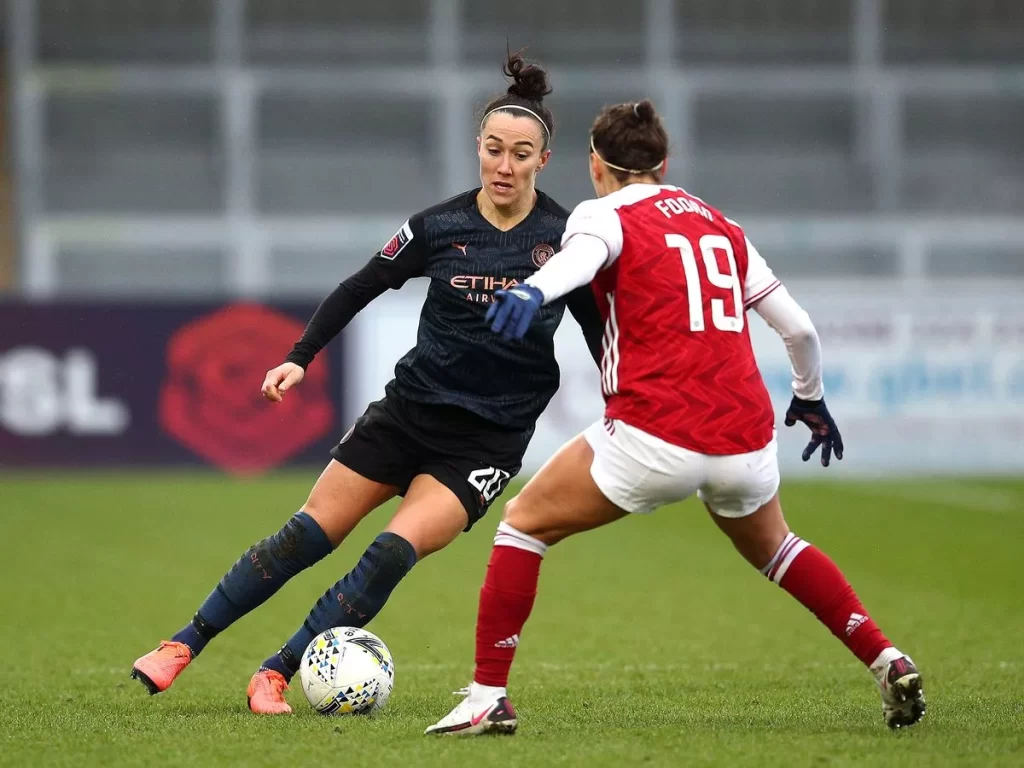
Foord, herself no stranger to FIFA accolades having been recognised as the Best Young Player at the 2011 Women’s World Cup aged just 15, has seen her star rise considerably since joining FA Women’s Super League side Arsenal from Sydney in 2020. Among the regional NSW town of Shellharbour’s most famous exports – along with UFC champion Alex Volkanovski and fellow Matildas legend Michelle Heyman – Foord’s technique and guile have been on full display in this tournament, exemplified by her dead-eyed finish through Lena Christensen’s legs in the Round of 16 against Denmark.
Combining seamlessly down the left flank with fellow Arsenal mainstay Steph Catley, Foord has grown into the tournament, finding her feet first as an out-and-out striker in place of Sam Kerr, and later as a complementary cog on the left flank, supplying Fowler, van Egmond, and eventually Kerr with service akin to a white-gloved waiter. For Bronze, her choice appears in two: pressing forward as part of Wiegman’s four-strong midfield and allowing defensive counterpart Jess Carter to step into her role as the right-back, or halting her advances to serve the common goal of eliminating the attacking potential of Australia’s left flank.
Australia vs Fatigue
Following Australia’s 2-3 defeat to Nigeria, questions were asked about Gustavsson’s reluctance to use his substitutes to change the game, especially considering the Super Falcons’ willingness to inject fresh players into the match, changes that drew immediate benefit in the form of two quick goals. Even the Swede himself conceded after the match that he would need to review his tactics: “[in] terms of the late subs, I think that’s a fair question, and that’s something I need to look at as a coach… We did get a massive effect positively when we did it. Did we get that because I did it in the right moment? Or should I have done it earlier, and we could have played longer with that positive effect?”
| Minutes played, Group stage to Quarter Final WWC 2023 | |
| 480 | Mackenzie Arnold, Ellie Carpenter, Steph Catley, Clare Hunt, Alanna Kennedy |
| 479 | Caitlin Foord, Katrina Gorry |
| 475 | Kyra Cooney-Cross |
| 430 | Hayley Raso |
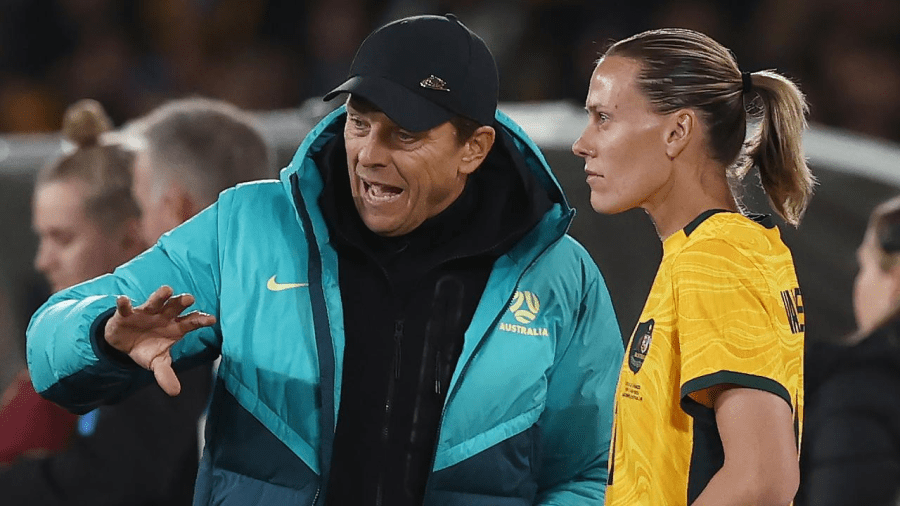
As understandable as his decision to play a full-strength team in the final group stage fixture against Canada was, Australia is now left with a group of eight players who have played over five full matches in the past three weeks, including 120 minutes against France. Gustavsson has said that the team has focused exclusively on recovery in the intervening period, saying after the victory against France “…we don’t need to train to be tactically prepared. It’s more about making sure we’re mentally and physically prepared for the semi-final,” though that ability to recover will be sorely tested against an England side capable of strangling teams unable to match their physicality.
In saying that, England themselves didn’t have it all their own way against Colombia: despite having the majority of possession, the Lionesses withstood nine shots from Las Cafeteras after Alessia Russo’s 71st-minute goal, and were only able to withdraw Russo and strike partner Bethany England in the game’s final moments. As both teams reach the limits of their physical capacity, it may well be these key changes as much as the tactical nous of the managers making them that prove the difference in such a close contest.
Prediction
The first meeting of these two teams at a World Cup, this match is no doubt going to be an absolute classic: the mercurial hosts against the until-recently underachievers; the tactician’s dream against the fire-and-brimstone counter-attack; Wiegman’s only tormentors against her players’ most familiar foes.
Australia will be buoyed by their recent victories against both Great Britain and England, but will be keenly aware of what awaits them at Stadium Australia this Wednesday evening; for England, the chance to wipe away a decade of disappointment on the global will require one final push against 75,000-plus opponents in the biggest game of their lives.
Strap in, it’s going to be a hell of a ride.
Australia 2 England 1 (AET)





